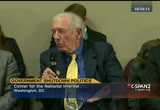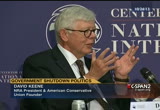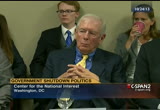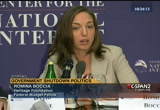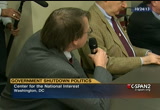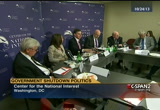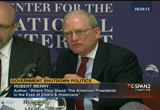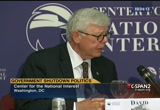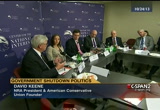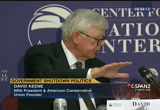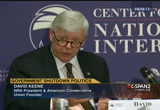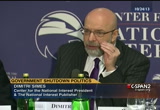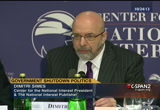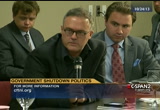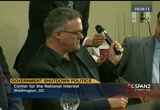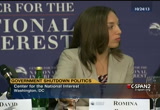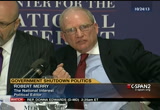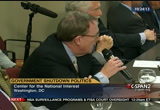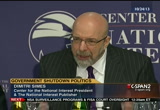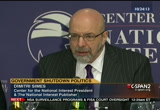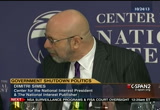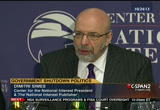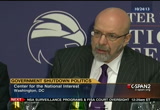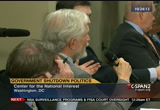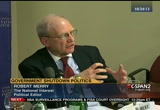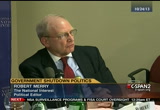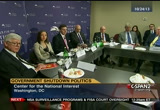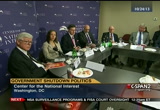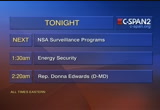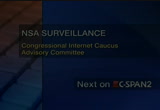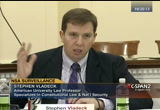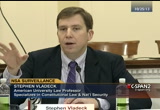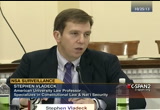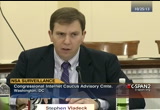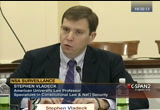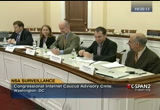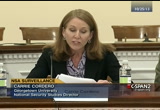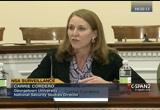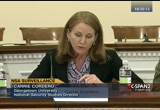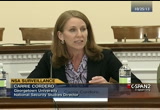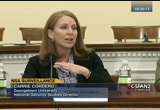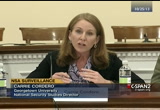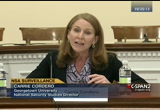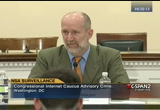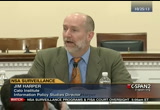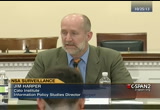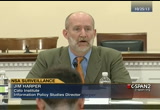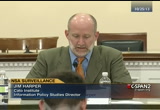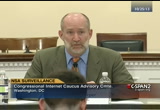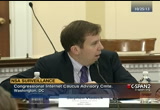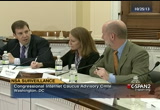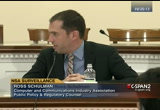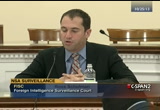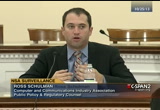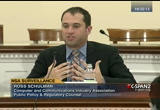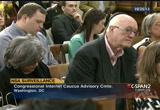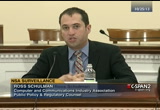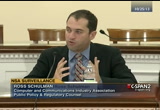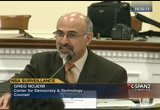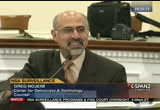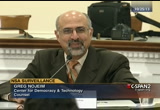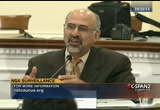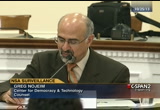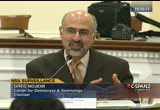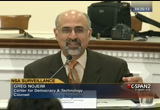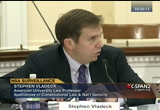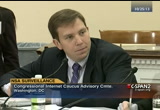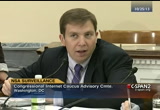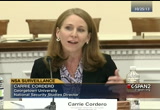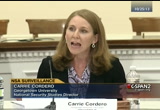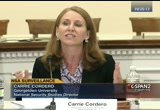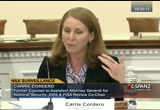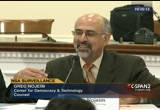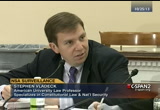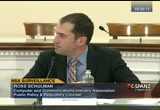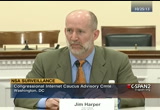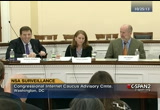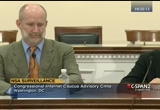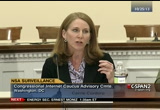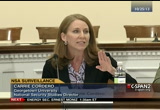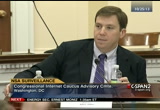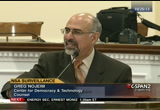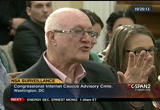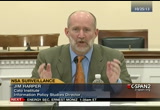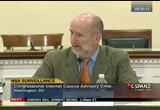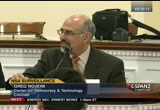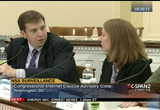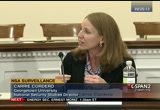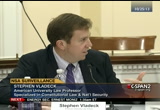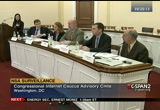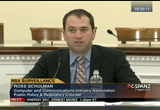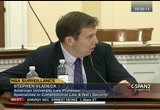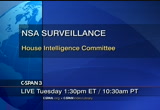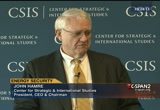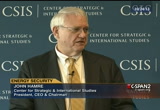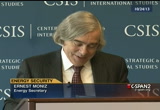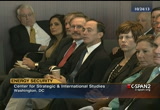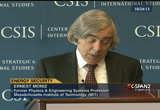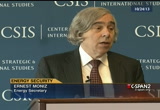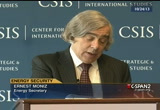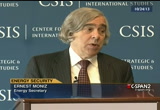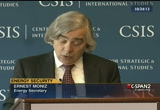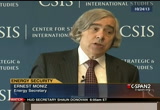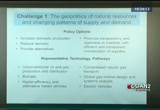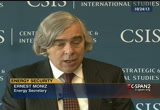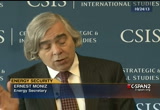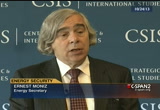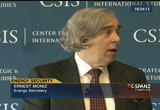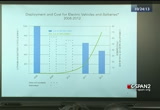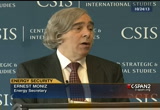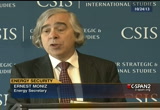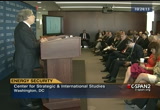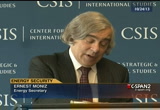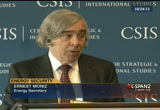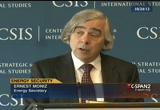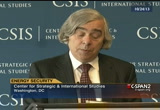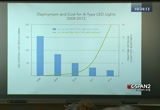tv Key Capitol Hill Hearings CSPAN October 29, 2013 12:00am-2:01am EDT
12:00 am
>> fundamentally dysfunctional, 80% of the citizenry doesn't trust it. >> there was a more important number in that recent survey, for the first time in american history, majority said they feared the american government, and that's new. the most droughtive thing, we got the dysfunction, all this, and, you know, regardless of which side, if you live in peoria, what side of the fight you live on, you don't like the fight. i came to the town and worked for the vice president who went on and mixed up with opponents, and we took a poll and 65% of the people agreed with him.
12:01 am
americans don't like that fight. regardless of whether they agree or not. you got that. you got a government that's earned distrust of the american people, and that's what the pop pewist uprising is about. people are fearful of the government. the most damaging thing taken place in the last year is not the fight over the budget, but the nsa controversy, the irs controversy, all that, which is not only been dismissed by the government, but defended by the president saying that, well, that's just them. i didn't do that. nebraska's been punished for these things, and people are beginning to become afraid of the very government, and that's the danger to the democratic system. >> anyone else with a quick comment? >> i think also the kind of spending that happened with the stimulus and how it's very apparent that a lot of federal funding goes towards politically connected groups of people just as well as certain law changes
12:02 am
like delaying the employer mandate, but keeping the individual mandate on the books when it comes to the president's health care law. i think people are paying more attention. they have more access to more varied view points on what's happening in washington, and they learn too many of our lawmakers are not representing the interests of the american people well, but their own interests and interest of well connected groups in washington. i think that's another reason why people are increasingly distrusting their government looking for somebody who will represent their views. i think they are looking for principled leadership, and i think we saw some of that with the shutdown where some lawmakers stood for principle, know the law is bad, and we -- lawmakers, they didn't vote for it. it was passed on a purely partisan basis, and the house has the constitutional right to deny funding to laws like that,
12:03 am
and an attempt to do that was important to show that lawmakers act on principle at times and in the best interest of the nation. >> our next question, i'm going to work up here because we have a lot of questions from jeffrey who is the author of "rule or ruin: definitive book on the rhinos". >> okay, well, i speak for the rhinos. actually, the question that is worth asking here in this setting is what would nixon have thought? people tend to forget that nixon was challengedded in the republican primaries in 1972 from the right by john ashbrock, and i feel i heard a forceful articulation of the point of view from the panel today opposed to anything that might be defined as the governing wing of the republican party. i could take issue with any number of statements that i heard whether they are on constitutional issues, political issues, factual issues, but i don't have to because the
12:04 am
argument plays out within the republican party, and, particularly, the force we have not spoken about, the tea party against the governing wing of the party, and i point you to the op-ed in the new york times by john taft saying mr. conservative would not recognize the republican party today. the reputation of fiscal integrity based on irresponsible actions of the tea party, and i point the article in the national journal today on business groups challenging tea party candidates in the primaries and putting up candidates against them. there's a full blown civil war inside the republican party against arguments heard today, ai wondered if anyone has comments on that. >> yeah, i think i have a comment. i'm not impress with the idea that somebody from the past would not recognize the republican party or this or that today if they were alive. robert taft would not recognize american society today if he was alive. this is a totally different life and situation, and the political parties are struggling with
12:05 am
this. we have these movements throughout america and the history of america suggests, michael, that these movements populist, whatever, the antiwar movement, the democratic party, largely, and late 60s, early 70s, or whether you're talking about what andrew jackson himself spawned after the 1824 election, ect., whether you talk about the tea party, they all have to get absorbed somehow, and so it's not just -- it's not going to be sufficient. in fact, it's counter productive and silly, really, frivolous, to suggest we ignore the tea party because robert taft wouldn't recognize them. these movements, in our system -- go back and look at the presidential electoral tallies in the early part of the depression including during franklin roosevelt's time, the
12:06 am
number -- the vote tallies for the socialist and communist parties in america were beginning to be rather significant, not necessarily in percentage terms, but in body terms, significant body of political sentiment. roosevelt brilliantly blanched that boil and brought it into the mainstream. that's what report taft of today would have to do, and that's why i kind of reject the thrust of your question. >> yeah, i'd like to say something if i can. i was -- i -- today i'm between the tea partyers and the others, and i was then, and i remember talking to john ashbrook as he was preparing to launch primary campaign against nixon, and i said, john, why are you doing this? you're only going to get 10% of the vote. he looked at me and said, i'm doing it, dave, because someday we're going to want to say we
12:07 am
warrant there. that's one reason that people oppose establishment figures who they think have gone off in the wrong direction. more importantly, bob's exactly right. a few years ago, i was at a meeting where a former republican congressman was whining about the fact he went to a county republican meeting in florida, and there were 200 people there and 180 of them were for ron paul saying this is horrible, we have to keep these people out. i said, well, it seems to me that the problem is not what the ron paul people. it's with the regular republicans, that they only can round up 20 people for a meeting. the job of a party, this is what bob is saying, is not to be exclusive, but to bring people in. parties, in a two-party system in particular, are coalitions of people. effective campaign manager is like a product manager.
12:08 am
he's got to have a product that's going to sell to a majority of the people, which makes it tougher than it is for a corporate product manager because he has to get 51% for the candidate or party, and that means as a practical matter in the long term of amule rating the differences and getting people to agree on more things than they disagree. if he or she can't do that, ultimately, they fail. as the country changes, as the issues change, as the culture changes, you have to be able to absorb new groups into the party or you fail, and the republican party, i've been there through those. when goldwater came along, the northeastern and midwestern party leaders said they wear brown suits, we don't want them. in those days, the leadership was picked by the manager of the steel mill, the banker, all that. they came in, became the people that ran the party. when reagan ran, the same thing took place about westerners and
12:09 am
folks that didn't get it. when path robertson came along, famously, michigan national committee men said visiting a political meeting with him around was like the bar scene in "star wars," and all those people socialized into the party and became leaders of the next generation. to go back to the ron paul question, in the last election cycle's primaries, for voters 30 and under, with all the candidates in the field, 50% voted for ron paul. that's not something you can throw out if you've got a growing -- if you have a growing membership. you have to be able to look at these things and bring them together. new people in politics often are unrealistic. they don't get it or understand the details of washington. they shouldn't. it's not their job. the party leaders, if they want to continue to be party leaders or if they want their party to continue to be successful, what they have to do is bring those people in and give them a -- let
12:10 am
them develop a degree of sophistication to succeed in the political process. it's easy to talk about keeping people out, but in the democratic system, the job is not to keep people out, but to bring people in. >> i was not in the nixon add moorings, but i knew nixon well in the later years. he was my friend, mentor, the best man at my wedding. nixon liked to be a very unpredictable man, but one thing i know for sure, that nixon viewed himself as first and foremost as a foreign policy nation security president. that was what he really loved to do. that what really met to him the
12:11 am
most. the idea that you would have the president of the united states like barack obama, who has, in my view, actually, pragmatic and reasonable foreign policy, but for whom policy is enough, but not a priority. i think richard nixon would have great difficulty identifying with that. the second thing is, the thing which i think in common if you talk about richard nixon and ronald reagan was, obviously, they were fairly big men in their own way, in a different way, and they never would say my party, my republican party, right or wrong. what i think they would say, and reagan arian takelated well, i will not speak ill of a fellow republican. when you hear this kind inside the republican party, and when
12:12 am
you have a crisis like that, few republican senators essentially, like that administration and focusing on tactical errors of the departed, there is something -- something that ronald reagan and richard nixon, in my view, would not be able to identify with. >> the question quick, please. >> two quick questions. one, sounds great, absorb the tea party in the republican party, but i don't know how you do that when they seem to be dramatically rejectionist in policies and act like an opposition rather than a party that wants to gromp or contribute to governance. that's the first question. the second one is your comments on entitlement reform, i think, i entirely agree with, but depiction of the constitutional
12:13 am
mechanisms is bewildering to me because i thought that the founders wanted to create a state in which democracy would -- was functional, you know, supposed to create a nation with democracy would work rather than the alternative, monarchy. i don't see how stone walling and rejectionism is a part of the mechanism. adopted as the law of the lands, try to make it work, so on, and so forth. no, i'm saying, i don't understand where that part, ahead of the law, i had a somewhat different picture of the constitution promote governance rather than the opposite. >> i think on that point, i fundamentally disagree. the system of checks and balances is there to prfs
12:14 am
minority from majority rule, and it was set up with so many checks it promotes dysfunction. once a law is on the books, it's difficult to change it, and there are few mechanisms that force compromise. some of them are these kinds of deadlines that we have like the debt limit or the end of the funding year, the end of the fiscal year. the system is there to arrive at compromise through struggle and through some dysfunction. >> the gentleman next to you. did you have a question? >> yeah. >> just work the way up. >> could i respond? very, very briefly. the question which didn't get addressed as to how do you split off these -- how do you absorb
12:15 am
people when they are rejectionist? i think history indicates successful politics entails cutting the ranking file away from rejectionist, often radical, sometimes quite ridiculous leaders, and we see that today. the perfect, great example gets back to michael's question with richard nixon who was the governing party, of course, but, you know, he was 43 p% president for four year, and then he was a 58% president. what's the difference? it was absorbing into the republican republican party. he took heat for that, people attacked him. the fact of the matter is that's
12:16 am
what effective politics is about, and that's what the leaders of politics have to do now with the tea party. >> wap? i mean, the gentleman next to you, sorry. >> i heard the same critique of the administration it reminds me of the carter administration in post vietnam years, and i wonder if you would address the fact that the united states remains the world's preimminent military power, and the saudis complain that we're not doing enough, just as you describedded, and yet nay rely on the third fleet to keep the strait open. the israelis complain and will continue to, yet they hope the united states joins them because
12:17 am
they can want destroy the nuclear facilities themselves. they lack capability. the economic power is diminished relative to china and other countries, but it remains the preimminent economic power. is this period worse than the period of the 1970s or not? >> well, i don't want to sound like a defender of jimmy carter, and he had share of faults, but rearm this was post vote nam years. this was after watergate. this was after deep crisis, years of foreign policy, a deep crisis in american governments, and there was such thing, i'm sure you remember this, when the
12:18 am
country was reluctant to do anything. jimmy carter hardly improved, but you had to sympathize with the predictment. president obama came to power after two terms of george w. bush that did not improve american global standing. at the same time, the united states, as you said, remains the predominant military power, no question about that. the united states remains a predominant economic power. that's what putin basically was talking about at the forum. in terms of the roll of the financial system, we basically build it. we continue to run it. everybody depends upon us, including the russians and chinese. we, also, lucky to have
12:19 am
adversaries and difficult partners who hardly could claim that with the united states, and none of them are attractive and more attractive system of government to follow, all of them have serious economic difficulties, other leading emerging markets, which looked like big winners a couple years ago, more than the share of problems, and the united states is, in my view, is a leading power and remains in my view the exceptional power. the problem is that even if you are the exceptional power, you have to act responsibly, and in the purpose, and i think that when people in different countries are looking at your
12:20 am
foreign policy under obama, they asking what kind of barack obama are they dealing with. i got the leading german who reminded me that obama came immensely popular in europe and especially in germany when he was a candidate and how he went to berlin and delivered this speech which actually propelled him to become peace prize winner before doing anything as president. there was a huge promise from barack obama. this is respect of the. , and at the same time, interest use on a regular basis, american purpose. now you have a situation when the chancellor of germany is
12:21 am
calling u.s. believer, spy and many others in germany unacceptable, not the only difficulty in u.s. relations. when people look at obama's previous speeches, his speech in cairo, his initial approach to china when secretary clinton said we're not going to lecture you on human rights because we know how they would respond, they would talk back and not lead to anything. the initial obama approach to russia the so-called policy, and what we have today? wake up today, the united states, nixon, and nixon and kissinger had a policy when the united states would have a better relationship with beijing than they would have with each other. it was a very successful policy. there's serious differences between china and russia today.
12:22 am
you can see how china and russia are becoming closer and closer, and that is a direct result of the obama administration foreign policy. does president obama want to accomplish something like that? i don't think so for a second, but he looks at everything in my view, does not want to expose himself to any domestic policy or criticism, and as a result, foreign policy is at halt and counterproductive, and we wonder what do we stand for? can we trust our word? yes. the president of the united states cannot voice stability. wayne and fellow next to you and here, let's gather them up. wayne? >> i'd like to ask robert to expand on something that he touched on early on in his
12:23 am
remarks, the dynamic of the issues outside of washington and country as a whole because it seems to me that for much of the country as a whole, this is not just about the financial and fiscal and budget issues that cop soup washington, but about other issues that are sometimes in the rubric of the culture wars. in those issues, washington is not the main seed of battle, but issues that take place in the checker board across the country like legalization of marijuana, we have issues taking place, and washington is often not a player or reactive. the obama administration has been very opposed to things like decriminalization of marijuana use. it's playing catch up on other cultural issues. my question to you is given this dynamic is not just about
12:24 am
washington, but about america and american society, where do those issues play in in a situation where the battlefield is washington who could get involved in closing down the government battles, but that may be irrelevant to other disputes. >> that's right, and i have not thought on that. i first want to apologize to jeffrey, and first name misused in adjusting to that earlier, sorry, but, wayne, you're absolutely right. this social and cultural matrix is front and center to the question of what kind of a country we're going to be. it is a great driver of the frustration that leads to the tea party who are focused on economic issues, but there's an
12:25 am
undercurrent and interestedded what they say about it, but there's an under current of it as well, and what's happening there, not so much in terms of washington, and not even to some extent in terms of local governments, but the cultural thinking of america, largely driven by our younger people is really altering all of that, but generates frustrations that can be directed or misdirectedded # by people who feel frustrations. we are seeing. there's the supreme court decisions which agitate people further on those issues as well. you're right, that washington is not driving that. washington is the recipient of those, those waves of sentiment becoming more and more significant just as the local governments are and just as people generally are, but it's contributory to the mood of the country and the question of what kind of a country we're going to
12:26 am
be. it's the definitional issues of america that generate those kinds of -- conflicts and deadlocks we have today. the greatest definition issues was the issue of the 1850s regarding slavery, and it was not solvable through normal democratic processes that have. so brilliantly established by our fathers. we have, i think, a last question right here. from this gentleman. waiting patiently. if you could identify yourself. >> yes, of course. >> i think it's on. >> yeah. my name is -- [inaudible] slough vain ya. came to town months ago, and, of course, listening intentively to the panelists and talking about foreign policy reprecushions. at this time, i don't have any
12:27 am
question, but allow me to make a brief comment, just a sentence or two. of course, i would not like to meddle -- i don't like to criticize administration or anybody else, but as i said, as a friend of your country, i would like to say that i remember in the past on many, many occasions, we were told american system of the government is an example if not the best way to run a country. of course, running the country and play a role of the leader and to the benefit of the world, and what i'm trying to say is like results of the las government shut down, i came in the middle of it, and others that i have had today are
12:28 am
damaging your image abroad. >> i'd like to end the session -- >> on that happy note. [laughter] >> it occurred to me recently the republican party is too interesting for its own good, at least politically, but it does make for great coffee, and you can read about the issues and others in our magazine. thank you. [applause]
12:30 am
>> a memo obtained by "the guardian" newspaper reveals they spied on the phone calls of 35 world leaders. next, privacy and national security legal experts discuss the nsa's surveillance programs and the oversight by the fisa court. this event hosted by the congressional internet caucus advisory committee is just over an hour. >> i thought i'd start before turning it over to the distinguished panelist by brief grounding in the terms you'll hear a lot of in the next hour because we'll try to cover a fair amount of material here
12:31 am
today. let's start at the beginning. it was enacted in response to concerns about surveillance abuses in the 1960s and 70s. surveillance conducted just about entirely under the offices of exec five ore. there had been little statutory law governing the government's foreign surveillance practices or governing the murky gray area of domestic intelligence surveillance. fisa was enacted in 1978 as a multifacets compromise, and the idea was to give the government most of the surveillance authority it claimed it needed in the context of foreign intelligence, but impose at least some legal safeguards, some statutory rules, judicial oversight to ensure the
12:32 am
government didn't abuse authorities congress decided it should have, and so one of the centerpieces of the statute was that creation of the new two-tier system, the fisa court, the court itself, originally seven, now is 11 article 3 federal district judges hearing applications from the government in cases arising, and then in an appellate panel called the fisa court of review hearing appeals in cases that the government lost. that was the basic frame as statute was written back in 1978. now, fisa went through a series of reforms over the years, but what the sort of -- the next big set of reforms and reason why we are having this conversation today involved a pair of programs that we are now privy too thanks to leaks by edward, and so i'll describe programs first and briefly talk about the authorities. the two programs receiving so much attention over the summer,
12:33 am
moving on to other programs now, is what's called the bulk met that data collection program under section 215 of the patriot agent. this is basically the concern that the government is obtaining from phone companies congress enacted it as part of the act in 2001, the so-called business records provision, and so one piece of this is the scope of the business records provision and the oversight provision and how well or not well that has worked. the other big program that, you know, we heard early on in the disclosure is the prism program, which is we assume carried out in the office of 702, created in
12:34 am
2008 as part of the fisa amendments act. there will be a quiz, so be ready. thed why behind section 702 # was to look at intelligence information, to look at information involving noncitizens outside the united states who, as i suspect most of us know, don't have fourth amendment rights. the idea was that here's an area where the government doesn't need quite as much as an individualized justification to obtain relevant information. the concern under section 702 # # is in the process of obtaining all information about noncitizens overseas, the government is also obtaining lots of information by accident or at least incidentally concerning americans, e-mails, other kinds of content, and, indeed, that the government may be tapping directly into the backbone of big companies like facebook, google, ect.. these are the programmatic
12:35 am
matters that led to the discussion, reform base we hear about over the summer, and they raise fundamental questions, not just about fisa as enacted, but about whether the transparency and oversight mechanisms that have are risen under that are effective, and so the idea behind our briefing today is to give you guys both a sense of what those transparency and oversight mechanisms are and why they either are or are not or are debatably working, and, indeed, since there's so much call for reform in some parts of congress these days, we give you a sense of the merits or lack thereof of the competing reform proposals as we see hearings, for example, in the senate judiciary committee, and next tuesday, the following monday before the privacy and civil rights oversight board, and the short version is, right, now is a time ripe for discussion about
12:36 am
whether fisa needs fixing, and if so, how to fix it, and so hence this briefing to sort of talk about where we are and where we might be going. that's the plan. i'm going to very briefly now introduce our four speakers who will hopefully not prove my wrong in the next 45 minutes. you have access to the full bios from the website for the event. i'll give you the short, short, short business to quote "princess bride," and on the left is the director of georgetown university law studies. jim harper from the cato institute, to jim's left, ross, a former student of mine, lived to tell the tale, computer industry association, and at the end, last, but certainly not least, greg from the center of democracy and technology. they're going to speak in this order, and then, hopefully debate a little bit. with that, i'll turn it over to carrie. >> terrificking thank you. i've been asked to talk about
12:37 am
oversight structure that's in place with respect to activities or, in particular, the nsa surveillance activities we've heard about in the recent months. let's get started. at the 30,000 foot level, the take away is covered by all three branches of government, and it's governed by a comprehensive set of laws, executive orders, attorney general approved guidelines and procedures, court orders, and then internal agency specific rules and procedures. there are reporting requirements. these are written reports required by statute and court order. there are briefings conducted by the intelligence community for members and staff. i think it's fair to say that the oversight structure likely involves hundreds of people, lawyers, analysts, auditors, seen your management, and outside judges, legal advisers, and congressional members and staff. how does that work?
12:38 am
at the first level of oversight, worth respect, and the 702 programs steve mentioned. there is internal oversight within the collecting agencies themselves. this is within the intelligence community element. there are supervisory level approvals at the oaring'sal level for targeting decisions, offices of general counsel, compliance offices, a network of civil liberties and protection officers at nsa specifically, the position created specifically soon, but other intelligence community elements have these officials already. there's an intelligence community, and then there are inspector generals, and i'm using the plural because these are the types of offices and oversight personnel that exist at most, if not all of the intelligence community elements. once you leave interim agencies collecting information and oversight offices and personnel
12:39 am
involved, you go to a second tier of outside agency still within the executive branch oversight. this is compromised of attorneys, civil liberties, auditing backgrounds, which are outside the operational entities which is important because they have some degree of independence. these include attorneys at the department of justice, specifically the national security division which conducts the oversight on behalf of the attorney general and the director of national intelligence and civil liberties protection officer which is a nonpartisan seen your professional reporting directly to the director of national intelligence. additional layer of oversight in the exec five branch with a reconstituted president civil liberties and oversight board, and i think there's more oversight by that as we go
12:40 am
forward. to drill down specifically on the 702 collection, which, again, this is content based collection that targets nonu.s. persons reasonably believed to be outside the united states. there are very specific and detailed mechanisms. the attorney general and dni review compliance with the targeting proceed procedures under section 702 with a joint report provided to the court and intelligence and judiciary committee. the government recently declassified the august 2013 version of the joint attorney general dni report, and although parts are still classified, that provided a good insight into the types of oversight that take place. for example, it indicates the review teams, review compliance of all three of the intelligence community elements that are identified as participating in 702 collection or analysis, review targeting like targeting decisions and justifications and documentation. they review compliance with
12:41 am
minimization, which is minimization as a term of art regarding what procedures and rules the intelligence community uses to protect u.s. person information. this oversight process is an effective check on compliance matters, and what's contained in the august 2013 joint assessment is nsa's current rate of compliance in the programs is less than one-half of 1%, and if you take away the compliance issues that are only with respect to reporting delays, so, for example, nsa is supposed to tell the department of justice and directer of national intelligence about a compliance incident, but they make the report a day late, compliance rate drops down to about a quarter of 1%. this is what takes place in the branch, the judicial branch, the court's review, there are judges themselves, and there's also
12:42 am
independent legal advisers who work for the court, and court can request additional information that it wants. there are also oversight in the judiciary committees, and they included a requirement for a detailed report, and they have to fully inform, and there are additional reporting requirements specific to similar review, but somewhat different than 702 because there's no content, a different frame work than what's required by law. where the compliance team, again, the team that reviews in 702 oversight substantive information about how targeting decisions are made and then
12:43 am
reviews the contents of reports to ensure compliance with the rules, 215 oversight is structured with specific restrictions in rules imposessed by the court. in the 215 program, data is up front and detail procedures laid out in the courts order about how the data can be queried, and there's detailed rules by which nsa queries data and who can improve terms and how the data is used. the statute itself requires the department of justice and director of national intelligence conduct the oversight specifically which includes the office of general counsel and civil liberties protection this is at the gran nuclear level, but civil liberties protection participate in periodic reviews if not at
12:44 am
the same level of granularity as the 702 program, and i think i'm out of time. >> fantastic. wow, impressive. okay. thanks, carrie. so, jim, carrie had a thorough going picture that sounded like a lot of oversight. what do you think? >> it did, indeed, and reminds me of arguments i saw developing over years that privacy is not having information in control of data subjects, you and me keeping control about us, but privacy would be a system of oversight with sufficient boards, with sufficient government self-regulation that preserves privacy. my own experience as a member of the department of homeland security is data privacy and data integrity advisory committee belies that view. the privacy committee and the dhs chief privacy officer same to see the role as one of largely defending the agency rather than insisting on privacy. i'm going to talk a little bit -- come back to that in the
12:45 am
discussion, and i'm very pleased to be on the panel in particular because i work both on fourth amendment issues and on data transparency issues, particularly with respect to congress and the executive branch spending decisions. i got a paper called publication practices which i won't detail because it's about data, but the first element of making information transparent is making authoritative source, and a secret court system cuts out that very first and most basic element of transparency which is an authoritative source of information about what's going on. transparency is really sort of a wide array of practices that permit appropriate oversight, and at the risk of being too simplistic and sounding like a lawyer, in our system of government, there's checks and balance, and each blanch of government should oversee the other, that is the transparency should be efficient to allow each branch of government to
12:46 am
oversea -- oversee the other, but it takes more than that, and transparency systems that exist, if you will, in the constitutional structure, are thorough going than that. the right to due process, for example, in a way of speaking, gives affected parties a right to oversight, that is to participate in tribunals that affect their rights. the article 3 case or controversy requirements requires the participation of adverse parties, real or potential, and there's no actual case under the constitution if there's not parties adverse to in this case, the government. that's the case of old that's not one of those u.s. cases. it's before that. parties and adverse parties are not just there for their own interest, but tools of the court. the panel can ask for whatever they want. they don't know to ask unless
12:47 am
there's a party working hard to ensure the information relevant to their case is available. smith versus maryland is the case, the 1976 case, in which one man, rather obviously suspected of burglarizing a home and making telephone calls to the occupant, was found not to have a fourth amendment interest in the telephone information. police knowing of the car license plate number and looking up who he was, went to the telephone company and asked. the company voluntarily observed the call and give it to the police which used that to get a warrant and further incriminate him. that case is the case the government relies on to say none of us have a fourth amendment interest in telephone calling data 6789 none of us, i believe, are currently suspects, and the selection of bulk data, data about all of us is far more revealing of all relationships in comings and goingings than information about those who is a suspect.
12:48 am
the fascinating thing here is that substantive conclusion is what allows the fisa panel to make a decision about whether we are allowed to participate. that is, the argument is that all americans don't have a fourth amendment interest so they can't come to court to argue. that's a failure of transparency because we don't have access to the deliberations of the court and for the most part, we have not had access to the rulings of the court. this is why i generally argue against calling it a court, but rather calling it a panel. there's not a lot of good academic research on what a court is because we have not seen the concept of a court tested quite so much as we have in this case, but courts do have judges. the fisa panel has judges, and well-meaninged judges, experienced judges who we respect, but judges don't alone constitute a court. a court requires a public appeal. that puts judges in a position, frankly, of being superintendentble to shame if they get it wrong.
12:49 am
the adverse parties present factual and other arguments to improve the quality of the court. public decisions allow oversight on the part of all of us, especially those in congress. these kinds of transparency measures are the actual things that make up a legitimate court. call it a panel. it certainly is a pam. i don't think there's argument about that. this is not a credible, actual court, not under article 3. it's important to think big about reform. remember the law was passed at a time when the soviet union was major contestant for power with the united states. the soviet union was a sophisticated government to be sure and posed nuclear annihilation threat. some of you remember this, but as a child, we did duck and cover drill, and i anticipated i would learn about my death from a flash of light off in the distance. today, we suffer no such threat.
12:50 am
there are sophisticated parties that challenge the u.s. government, but even today right now, there's an event going on at my think tank, cato institute, called dangerous world, inviting more thinking whether we suffer under the threats we did at the time the law was passed. we can reconsider whether we need a pseudo court system to adjudicate cases when there's necessity for secrecy. this panel is not transparent, and, in fact, by denying oversight, it's an attack on democracy. >> great, thank you, jim. i have a quick follow-up. when congress wrote section 215 in 2001, when congress wrote section 77 # 0 # -- 702 in 2008, they were mindful of the concerns; right? both provisions include adversary process before the fisa court, and the recipient of a production order, so think
12:51 am
verizon, right, allowed to challenge the order. under section 702, the electronic communication service provider, google, facebook, whomever, allowed to do the same. it's, in your view, have those proven to be ineffective? well, yes, congress has relied on a frame of reference that wrong at the time and proven more wrong, the idea that information we share with third parties is not an interest of ours, so our telecommunication providers do not stand in our shoes when it comes to our privacy, and many of them, if not most, have dealings with the government, regulated by the government, and they have plenty of reasons to not stand up for interest in court. >> explain why according to a letter from george walton, senator leahy, there's not a single recipient avail themself of the process. >> if you're a smart executive, your job is to increase profits of the firm, not to win on civil liberties grounds. that's why the breakdown of the
12:52 am
third party doctrine is very important to see soon. >> all right, cool, thanks, jim. ross? >> thank you, steven, and, also, thanks for putting on, obviously, what is pertinent and an important panel. i work for the computer and communication association and our membership, we were just chatting about it, and the segue was deliberate. >> i wondered about that. thanks. >> you know, it's interesting, you know, reggie walton's letter is interesting as long as we're on topic. we know now that yahoo actually was a company that went back to the court and fought actually up through the apalate process there and eventually, unfortunately lost the case that they had brought, but -- >> under the protect america act. >> yes. i guess not under those particular sections. that's true, but so, you know, talking about transparency today and transparency is a thing that
12:53 am
ccia has latchedded on to since, well, actually since before snowden, but definitely since snowden, talking about transparency going back a number of years under reauthorization of patrioting and fisa that we testified in the past and so forth, but certainly since, you know, june of this year when we started learning a lot more about what is going on, we've been talking, clearly, about the need for transparency, sent letters to both the president and congress and a number of members that filed a suit in the fisk against the government for the ability under first amendment irrationallization for the ability to talk to their users and their customers about what is being collected and how it's being collected, and the sheer, just the amount, the numbers of collection orders that they receive. we've also been, cci's been
12:54 am
vocal in supporting a number of bills here on the hill, i think both senate and house side, that would call for greater trarps paraphernalia sigh on the -- transparency and on the part of government on what they collect and how much information is actually being transferred. we're doing that because we think it's really important for companies to be able to talk to their users about the scope of the collection that's happening. in the online market place today, trust is of the utmost importance. if your users don't trust the service you're offering, they are not going to partake in it, particularly in a modern age when so much of our online services involve handing over a certain amount of your own data whether it's your e-mails or the documents that you're storing in a cloud service somewhere, whatever it is, you have to have trust that the service that you're working with is going to protect the information that
12:55 am
you've given them. i keep my tax returns on a drop box receiverrer, a bad idea, but they are encrypted so it's okay, but that kind of information is the sort of information we're talking about. it can be very personal information. it's the e-mails. it's, you know, it's the cookie recipe your grandmother sent you yesterday, but it's also details of your life, the, you know, the refinancing on your mortgage that you're discussing with your wife over e-mail. it's very, very personal information that we're talking about. if the users don't have that trust, then they're not going to partake in the services, and these services are great because they create efficiencies, make it easier for people to go about their lives. i can get to the g mail from any computer in the world, secure, and i can access it and it's going to be there. the services form the fabric of our lives today. facebook is a place where people
12:56 am
go and meet their friends and talk about all sorts of things. these services have become parts of our lives in way that can sometimes on a day-to-day basis is invisible, but step back and think about it and they are vital. this sort of transparency keeps those services in our lives kind of on that day-to-day basis. a lot of people, you know, the government talked about well, you know, we can talk in regime -- in general about the collection we're doing, and maybe that will be enough. you know, our point of view is that that's actually not going to be enough to solve this particular problem. the greater of precision here, the better. you know, if we try to hide certain pieces of this, that's actually, i believe, going to be only lead to a further breakdown in trust as people say, oh, well, you told us about that part, but what's behind the curtain?
12:57 am
total transparency is fundamental right now. it's also important for a greater societal reason which is less tied to the real concrete commercial aspect i've been talking about, but that is that it's dangerous -- we're about to embark on having a national conversation about what the correct use of surveillance is over the interpret, and having that conversation without the data to back it up is i would say dangerous. i don't think it's the right way to go about it. people get the wrong ideas, you know, the truth of the matter will be inflated, either, you know, by the press or by fears or it can be, you know, artificially deflated in some ways as well, and that's dangerous. in order to have this conversation and do it right, we have to know what to do with what we're talking about. that's why transparency is so fundamental right now. a quick note about oversight because it's part of the topic, but i do think oversight is fundamental right now also.
12:58 am
a lot of people talk about independent advocate at the surveil lansz court. we think that's an interesting idea, an idea that needs to be implemented properly, however. it needs to be properly funded. you can't just sort of tackle this on to another clause, go home, and say, hey, we did oversight. i think who you put in the independent advocate space is vital. it needs to be -- you need to have topnotch lawyers, topnotch technology, people who understand the internet, understand how it works, and where the points of failure are. they have to take that and educate the tisk op what's going on there. timely, you need to make sure it's not just captured by the very groups they are meant to advocate against. you can't just hire former nsa staffers saying, hey, we have oversight now. edward snowden even. who apparently is making noise about testifying before congress
12:59 am
via skype which would be interesting. >> really? all right, greg, we heard some sort of concerns from jim and ross about need for transparency and oversight. what's your reaction? >> oversight failed. that's the bottom line. that's what we learned from the disclosures. all the things carrie talked about, all mechanisms put in place to protect privacy, oversight tailed. -- failed. now we have to figure out a way to reconstruct them. when you sthart to think about how to reconstruct oversight and how to make it work, think about the causes of the failure. one of the big causes of the failure was intelligence officials repeatedly misled congress. they did it at open hearings, and whether it was behind the scenes as well, we don't know, but there was misleading statements. they misled the public about what was going on. they even misled the court
1:00 am
1:01 am
when they have a briefing from intelligence officials about one of these programs, it's like playing 20 questions. you don't know what to ask because you don't know what is going on. if you don't know what is going on, it's hard know what to ask. so it seems to me that transparency is the biggest and most important piece of the oversight poz -- puzzle. kerry mentioned that the fisa court -- that the fisa court approved the standard under which the government does -- that they thought abouted. what she didn't mention most of the query of the data base don't involve any evaluation of that standard. most of the -- query had no finding reasonable,
1:02 am
the fisa court didn't know this for years. and yet that is the way the program was being conducted. so had the court known it might have been to be ask the right questions. it might have been to be stop what was essentially an unwaffled conduct based -- unlawfulled conduct based on it but it wasn't given the information. there are important reform in the works that would be helpful to reigning in these intelligence programs. one was already talked about the special advocate. the special advocate, though, he or she does more than argue the other side of the case. they have a role in transparency as well. the a special advocate as conceived in the legislation that has been introduced would have the ability to argue about
1:03 am
the adequate sincerity of the opinions that the fisa court is releasing in term of whether they are disclosing what they need to disclose. if the government -- not because the information is classified but because the information -- the government wants to hide what is going on, the special advocate can argue about the adequate of that which is released around a standard the bill would create. special advocate can also ask the court to invite am -- participation. it can trigger appeals. there's a lot of, i think, that the specialt advocate can bring to the proceedings that is beyond just arguing the other side of the cases. with respect to transparency there are a kind of two sides of it.
1:04 am
one is the fisa court opinion and the brief of people they are submitting. also the number of surveillance orders that they receive which talked about -- two big pieces of the debate on the kind of the volume questions is will the government be able to mosh together different -- number about order that are different surveillance authorities and threr by obscure how many orders are being issued under the different authority. where there be large ranges so you don't know the true number. will companies be allowed to disclose national security letters only they they receive 0 and 1,000. that's not very useful.
1:05 am
another reform i think is important goes to the guideline which the section 702 program is being conducted. fisa court for the program doesn't approve whether a target is up to something wrong. it doesn't approve anything about the target. it approves on an annual basis targeting and min myization guideline. those guidelines according to press report allow it a 51% likelihood that the target is broad. it seems to be good enough for the determination the back door searching loophole closing it by prohibiting a search of that data which is supposed to target people abroad.
1:06 am
it would be an important reform in the regard. no matter how much oversight there is, at the end of the day there's no substitute for legal limit on the authorities put in place. right now we don't have enough. thank you. >> that's great. i have two sort of very quick questions for you. for the first, i suspect some might be less spent -- skeptical might say a part of what we know about the misrepresentation concern on the scope of the program is because there was internal reporting to the fisa court that culminated in the now disclosed october 2008 opinion; right. basically saying dear government, there are three time you mislead us.
1:07 am
stop doing it. it long happened before we knew anything about. is there not evidence there's some -- within the internal secret process? >> it's so mad. he was yelling at his opinion. you could hear him screaming. yet who was he yelling to? he was screaming in the wind. he was screaming in the wind because nobody could hear him except for the government. it just doesn't matter when it's the case. how do we reconcile a fundamental tension between your suggestion the cure is public transparency and the purpose of fisa which is do all the stuff in the dark? >> if fisa was just -- in the old days the court come to the fisa court and say we have a guy we suspect a bad actor. can we sur ceil him or not.
1:08 am
this is why we this think. the court is making more involved -- they resolve questions of law. they are making unusual decisions. i think could not read section 215 is authorizing the collection of every record of every phone call made. it was never -- debated. in the world we have to have more transparency. i think some of the measures proposed now would give us some more transparency. without surprise -- comprising national security. >> let me start asking you. you heard i guess now all three of the other panel is say a little bit about sort of potential reform where reforms are needed. i guess i'm curious if you have a response on the adequate and notwithstanding that some of the
1:09 am
reform are being kicked around. i think it's worth pointing out. some of the points that jim and greg are making are calling for much, much broader overhaul of the fisa court system in place than some of the current pending in congress. delay questioning the foundation of the existence of fisa court and the existence of a court body that conducts its business in secret. that's sort of one set of arguments. the system ought to be thrown out and the entire system is ill e -- ill legitimate. i don't think with respect to staff. it's not the proposal before members right now. there's sort of a continuum of the type of proposals that are out there today.
1:10 am
but for the most part the proposal that exist in congress today are about making changes but maintaining the overall integrity of the fisa court as it exists. with respect -- and another point with come on something greg said. i don't agree that the current record support the assertion that the government intentionally mislead either the court or congress and perhaps reasonable minds can disagree about it. but the record that has been released with respect the court order and opinions indicate that there were compliance incidents and there were corrections and things were discovered later than should have been it's certainly the court not pleased with that. but there does not -- in my view, there's not a record
1:11 am
that establishes any sort of willful malfeasance on the government's point nap -- that takes us the various concerns one might have about the system. so first there can be a concern about institutional strategic level top-down puce. when we think about the 1970 era. no control no oversight no judicial check. not reporting to congress. there's that level of abuse. then there's a second category of things people might be concerned about the individual wrongdoing. they are the oneoff a person in the intelligence community in does something they are not supposed to do. >> like talked about classified information? >> or -- you've been dying to get that in. >> i've been dying to get it
1:12 am
in. >> these are the incidents contained in the nsa's inspector general report he sent to ?airlt grassily. it doesn't represent wide spread abuse. the third category is compliance incidents. and the contemplate there would be compliance incident. they have to be reported to the court and congress. not every compliance incident is create aid like. there are sort of run of the mill compliance incidents then there are some whammy that we, you know, saw in some of the judge's order. but again, even the existence of those compliance incidents, which were brought the court's attention as painful as it probably was for the court to do never appeared to concern insteeningsal wrong i do. >> i will say the work leading is not mine. it's judge beat's.
1:13 am
whether you -- , i mean, i don't know if we impede willfulness. it suggests something emergency a compliance. >> it's very frustrating. senator wyden tells clapper i'm going to ask you at the open hearing whether they are collecting records about millions or tens of millions americans. get ready. wyden asked the question. are you collecting records about millions or tens of millions of americans. clapper said no. not willingly. wyden said really? not whittingly but they were. they were collecting them and later admitted that. in another incident, at the last judiciary committee hearing, senator hey -- leahy took alexander to task and said you're saying there were 45
1:14 am
plots foiled through the program. that's not right is it? no, senator. it's not. it can't be that we can expect congress to do a good oversight job and the court to do a good oversight job when the truth is so hard to get. and again, the way to get the truth and is not throw out the court or throw out the court process all together. i'm not tughting it at all. what i'm suggesting is transparency a root toward the truth and we need more. >> let me ask you this. we talked about how no recipient of the 702 ever challenged it. it seems like part of the cfght at the public discourse level is not about the government. it's about private sector form and -- firm and the extend to which they are or not looking out for the privacy right of the customers.
1:15 am
i think our general approach is that i'm not opposed to having a conversation about laws governing what companies are and not allowed to the data they collect. i think it's important we do not divorce the two. we divorce the two conversations and not melt them in to one big monster bill that tries to do everything. that's, i think, a very dangerous idea. we can -- we can be oong i are at the government and the companies if we want to. but we shouldn't be angry at the company because of the government. okay. i would like to jump in on the point about how the issues are framed on capitol hill right now. by no means on your staff on
1:16 am
your choices or boss ice choices strained by the bill introduced so far. those are on the table. and i'm going do my best to make you hear about it if you tbhie to some of the tiny marginal proposal throughout right now. it's kind of surprising to me that house and senate intel committee leaders are proposing they reform. they need to get reformed. think about the whole sweet of issues put on the table. put more on the table because what is under discussion right now in the bill so far introduce is insufficient. i want to give the audience a few more questions. i have one more jim.
1:17 am
you keep alluding to the constitutional concern. you say constitutional issues and i think court. if there are constitutional problems the court will ride in on the white horse and save the day. i don't know if the horse is actually white. i guess the question is, do you think -- there are now several pending suits the bulk meta data program. do you think the litigation -- by actually putting the court in the position of answering these questions in a way that might cash out in a way i suspect you -- >> i don't know what that means. i'm not sure if i can an the question. i know, just lis -- justice scalia will ride in on a horse that was living at the time the constitution was adopted. [laughter] i'm hopeful, yes, that the court
1:18 am
will step in here and begin to reassert rights helping congress along very often the argument is read and rightly dismissed that the legislature should take care of the problems. we have privacy problems with the collection, courts we dmoant how to deal with it. but the fourth amendment is not a hopeful instruction to the legislature. it creates a 0 right of people in the united. against unreasonable search and seizure. i think the mistake and decision that lead to smith v. maryland should be overturned so we could have a discussion. >> any other members? >> i agree with that. to the extent they are looking at this and completely come down in a way i would have absolutely no fault with i don't think it mean there's no rule for congress. even if the supreme court
1:19 am
overturn it tomorrow, i would throw a party. >> yes, well. if he's still alive. i don't know. i think that would still mean that all of you would still have a huge amount of work in front of do you fill in a fourth amendment saying, hey, the fourth amendment does apply to -- the third party leave a lot of open questions. a narrow point. >> smith could be convicted without use -- >> it's smith can be easily distinguished. you don't have to overrule smith to why it's problematic. >> just to make two quick point. one which pertains to something people were talking about earlier. which is sort of the ability of the fisa court to conduct oversight. just to give a few thing. they have a ability to modify requested made by the government
1:20 am
and add in requirement to the order. the court can request witness testimony and additional facts for technical briefings. it can require additional procedures be carried out or add additional minimummization procedure. quickly on the point. one follow followup from the discussion you were having is roth mentioned a few minutes ago the protect america act appeal that went up to the fisa court of review. the protect america act very quickly of an interim statute before the fisa amendment act of 2008. and it enabled surveillance of persons outside the intelligence purpose without an individual probably cause for the fisa amendment act picked it up and added more protections for u.s.
1:21 am
person in the law that became more permanent. however, a provider as ross mentioned, did challenge the protect america act. and that went up to the fisa court of review, and the fisa court of review upheld the government's surveillance under the protect america act. which arguably, was less restrictive than the fisa amendment act is and the fisa -- even step further and affirmed there's a foreign -- the supreme court never ruled on the point. it was significant in 2008 when the review opinion was release that the fisa court of review went in the direction. >> we have about five minutes for audience questions. i might call the on people and wait for the boom mic to come. sir, in the front. >> you cited the conversation between senator wyden and director clapper. which brings me forward to the
1:22 am
angela -- do you think that the intelligence community default mode is simply keep quiet until it leak out or discovered on a back channel? >> thing is some history that suggests t the case. we would have never had the discussion about surveillance had information not leaked. i think there have some steps by the intelligence community to be more forthcoming. i don't think there nearly enough. too often they are just kind of defensive. it's not they're coming forward and saying this is what we're doing. we want to show people that what we're doing is proper and targeting bad guy, for example, that's not what we're getting. what we're getting is kind of like what i call counter dislow sure information came out. it's embarrassing. now we disclose information to counter it.
1:23 am
>> in the middle. >> let me draw attention move it away from the court process, per se, and a more fundamental. one of the big things true now that wasn't true a couple of decades ago the massive -- the ability to collect massive amount of information and the idea that has gotten in to the process is a distinction between collecting the information and looking at the information. and that has sullied the distinction sometimes in the reporting by the information on what is going on where the records thank clean ton for helping -- [inaudible] what is your view about the protection necessary, if any, on the massive collection of information with the proviso whether it's -- what the criteria ought to be
1:24 am
for both of those. is in a way to say focus on collection authority separate from the authorities? jim, why don't you go first? i refer to this a little bit in my discussion about privacy. a lot of people use privacy. it means a lot of different things to different people. and this alternative view of the world is that you still have privacy when information that was within your control is taken out of your control but subject to rigorous oversight. imagine if the government were to place camera in the bedroom of every home in the united states. viewing the cameras subject to restrictions and oversight and all kinds of things, that still violates privacy. because in the home today your privacy is protected by fact you close yourself within walls that are yours. you have a legal right, a trespass right. you're in control of the information about what happens
1:25 am
in your bedroom. were there to be a camera system in bedrooms the control of information over what happened there moves from you to the government. no matter whether information is collected, used or not. that's how privacy has been redefined to say that we've got data overhere. we're keeping it safe for you. you have the privacy. not true. suppose you actually did that google camera in the bedroom or google glasses, as the cay may be. isn't that closer to where we are? isn't that close -- doesn't my expectations this effect your analysis? we have two different very questions. one is whether google can place a camera in your bedroom. they cannot. you can bring whatever you want to the bedroom. people routinely share information subject to controls that are not well recognized. but that do exist.
1:26 am
there's an awful term to cloud which seems to suggest that information going to have internet is in a cloud. a sort of airy soup that anyone can ladle out when ever they want. you share information to google subject to limits. you asked a fuff question. the third party has data and they want it from the third party. is there going to be assessable to the government under one way or the other. you've got have some kind of a wall and a rule about how you go
1:27 am
over the wall. now what i don't suspect a world where as jim describes the government has to collect everything and decide what it gets to go over the wall. the government collects everything and the court decide when it goes over the wall. i think we have to have limit on collection and use. in the pb released public on the 215 she specifically talked about the importance of the proceed your and rule about accessing the data and were there not but for the rules and procedures that are in place, the court would ?rot been able to find the collection law. >> i guess one could say if the procedure are important why not codify them? >> with respect to the one program? >> right. they are government created in consultation with the fisa court. there are guidelines and basically regular --
1:28 am
regulations. >> i understand the argument for that and why there might be a lodge toik it. my caution about it would be that because we know that law follows so far behind technology, that you could write in the exact procedures today and six months from now the technology will change and maybe the government will figure out a new way to conduct the technology more privacy protective or simply just different. and then you're in a situation where the technology no longer matches -- >> the argument that the reason cannot codify it because it's not privacy protected? >> i'm saying that the -- a reason not codify the specific rules that are currently in the court order is because the technology could change then you're in a position where the technology has changed and the results in law and you need an act of congress to be able to change your process. >> fair enough. i think we have time for one more question. is there one more?
1:29 am
>> yes, sir, all the way in the back. >> this is a slightly philosophical question what we now know after the leak your view on -- for all of you -- your view in the nsa in the end was working within the direction and under the law -- under congress and the executive branch's decisions and direction or was it i.t. running among -- [inaudible] >> i guess i'll jump on that first. i think that's a hard question to answer at the general level. there are always example of individual officers who are violating the authority they have. my own view, and i don't know if the other panel would agree is
1:30 am
that for the most part, the nsa was doing that the fisa court signed off on. with a few exceptions that we should be worried about. but that -- but that the far more alarming that the fisa court signed off on an interpretation of, for example, 215, i think can be seriously questioned in the scope and expansiveness. ..
1:31 am
>> from my point of view. a failure of transparency and oversight. it causes these views not to be reconciled a and continue with these programs we discovered we have to have the debate about it and we should clear the air. >> i think the answer to your either/or question is yes. in some circumstances it was clearly operating outside the law with our analysis of 215 items see how you can read that but as he pointed
1:32 am
out people come to opposite conclusions but the more important question is if the vast bulk of what denis they was doing was completely legitimate then what does that tell us about the lot today? >> i think the nsa went beyond what the law permits it now argues that the members of congress to authorize to the law without knowing what the nsa was doing were debating it openly had ratified it. >> i will use the professors prerogative that federal law means nothing until five people on the supreme court says it does with his the diametrically opposite problem a district or fisa court decision has no value so the big legal questions to you have heard from this panel for all relevant
1:33 am
1:34 am
1:35 am
1:36 am
>> i am the president here will come to all of you many familiar faces here glad you could find your way over to rhode island avenue from k street. it is a privilege for me to welcome ernest moniz to be with us this morning. of course, the secretary of energy i first came to know him when we work together in the clinton administration he was the undersecretary of the energy department. we did a lot of things together not all that was clear. [laughter] we did a lot of things together he is a very
1:37 am
energetic guy and when ernest moniz wants to get something done he does not relent and he pushes hard but we became fast friends through this and i am grateful. of course, he went back to m.i.t. where at least the intellectual father of this remarkable series. you can say america does have an energy strategy but it does have a blueprint. that then led everyone to brief the enormous sigh of relief. to have the knowledge of the of bizarre political folkways but also something about energy it is remarkable we have this leadership at this time. so without further delay he
1:38 am
will start with a brief presentation than a little q&a that i will take it off to count on you to have great questions. [applause] >> i was planning to make a long presentation but i will convert to a realtime to a short presentation. [laughter] it is a pleasure to be here at scsi. also it is no joke asking the driver coming over why are we stopping here at k street? but it is your age pleasure to be here with your inaugural week. is an exciting time to be
1:39 am
back. you have a president in june have the to policy speeches the first in berlin with the nuclear security agenda then in georgetown the climate action plan discussion and as this audience knows very important elements of the agenda and i may say it also lines up with the scsi agenda that is why this is a great place. to make a set of remarks somewhat stimulated by the anniversary of the 40th anniversary of the arab oil embargo that clearly so many profound changes how we
1:40 am
address energy problems and of course, within a few years the department of energy to help address those problems. today in my now short presentation i will make a few remarks about some of the obvious changes but then i want to move on how we are thinking it's today's energy related security challenges challenges, what are the policy directions and in particular the technology pathways to follow those of policy directions and what we plan to do at the department of energy. 1973 cover regrettably too many who remember that in
1:41 am
the few who are younger than that. but clearly geopolitically no io, there was the soviet union, iran was a close ally may we cooling but not chilly relations but it makes a huge difference when we think back to that time. president nixon had just come back from china another watershed event with gdp 100 million at that time. here at home american household spent almost 20 percent more on energy at that time than we do today.
1:42 am
with the technology world and globalization was not a word in the dictionary at that time. obviously we all understand all of the differences and responses like the department of energy, a petroleum reserve, a cafe standards. actions taken but in the way that we should be thinking about energy security issues that is what i want to focus. this is also the case partly
1:43 am
the result to frankly have the overplayed hand at that time in terms of the embargo , a great diversification of supply in oriole starting with the north sea and alaska, brazil, canada, afri ca, gulf of mexico is a new place to produce. also at that time energy security running at of natural gas had a billion on the generation that led to the 1980's huge focus on coal so we forget the cold buildup was very much coupled to the security concerns that we struggle with but frankly have to keep the context as we engage with the debate on
1:44 am
climate as others focus on paul -- paul without to similar conditions. moved up to where we are today with obviously the rise of domestic oil gas production is a well-known part. just last year we have the greatest increase of oil production in our history. 1 million barrels per day and that was driven by the balkan. so a very different situation. today we have diversified energy supply besides oil, guest, nuclear and solar and other renewable. biofuels it is now the issue
1:45 am
is challenges as opposed to building of this alternative. clearly the huge increase or a idiot's on the demand side coming vehicles coming 11 miles per gallon, 24.9 on the way to 50. energy intensive the decline improvement to, etc., etc.. that is a lot of the background for the change will let me move for energy security challenges for the path ahead.
1:46 am
the fight could figure out how this works to put this out there the first point said geopolitics the supply a balance does remain the important securities concern. it would be a misconception with the increased domestic production that somehow we have become a free of this question of the coal real market or the coal oil price volatility which can be there. you can argue if today's prices our high, a structural, but we are in a
1:47 am
situation where there are substantial, unplanned outages with current oil supply making it tight the capacity and we are not independence of the global price. we still need to address this issue of the markets with policy options and technology directions to address this for phone-number one long dash number one is increasing domestic production that is something that we know is going on quite strongly right now but i want to emphasize a key policy and political objective has to
1:48 am
be continuing reduction of oil and independents so we still be to focus on reducing fuel oil dependence. that has three principal thrust from a sufficient vehicles, we mentioned the cafe standard we have seen the impact of this move in that direction with increased efficiency. alternative fuels in there we push on the pathway to the next generation biofuels we believe our energy efficiency renewable energy office from basic research to support beyond pilot
1:49 am
scale we believe the technology in place today is on a path with below $2 may be $2.15 per gallon of cellulosic ethanol. perhaps to the end of the decade. that is not gasoline equivalent but we are getting into the ballpark. but to provide biofuels that easily competitive cost. there's a lot of discussion about natural gas vehicles and one of the important sets of announcements recently is the fact we will see production of sales as a
1:50 am
reminder we have not had that as the unintended consequence of policy. that is changing. that is what the world does and this could open that pathway sigillate. finally, the comments efficiency, alternative fuels air that remains something we are strongly committed to and frankly pretty bullish about. here is a picture. the blue bars are a reduction of battery cars may be $500 per kilowatt hour by a factor of two in a relatively short time.
1:51 am
the green on the right is the deployment but this rate of increase is substantially higher than the analogous curb shown over a decade ago for hybrid vehicles. the first half this year the total deployment number of 75,000 will probably go up by 100,000 and continue to increase. that cost is still way too high for period electric vehicles to have large market penetration but by a factor of two for the plug in hybrids this will be very interesting. today we have models like the tesla that is not to
1:52 am
scale yet in terms of deployment but it is an example of something that closely resembles the classic disruptive technology theory. not competing in the commodity markets feted business model for extremely high-performance vehicles for gulf for the tesla was named "consumer reports" and others as essentially the best for one of the very best cars it ever tested. not just electric vehicles but cars as a tremendous high-performance vehicle. and next year they will start the export strategy.
1:53 am
we think these technologies are not as far out as people think but i will return to this point with some other slides of this nature with the themes that businesses are paying attention. when they pay attention you should figure something interesting is happening. on the resource issue to focus on oil and the continuing need for oil dependence now we are 40 years passed the embargo but also a second issue of resource concentration that is said to energy critical materials.
1:54 am
so there is the real issue trend a controlling the supply their other energy materials with the structure of lithium seven the isotope that turns out to be used in nuclear reactors. so this is new on the screen we have responded as the department and have the innovation hub at the ames laboratory in iowa and it is researching not so much producing these energy critical materials but much more focusing on what is the technology for recycling and reuse and very importantly importantly, a water substitutions? where can we find earth abundant materials to
1:55 am
functional they replace these energy critic called materials -- critical materials like when turbaned? so that is the first of these challenges associated with distribution. a second challenge we put it into this category is climate change in the associated natural disasters and humanitarian crisis that can result from climate stresses. i will be relatively brief to leave enough time for questions but i will say that my first day on the job if i was quoted as saying i am not here to debate what is not debatable.
1:56 am
in particular what i consider is the need to respond prudently to the risks of climate change. that does not answer the debate what you do about it. for the united states of course, obama put forward the climate action plan. if you have not looked at in detail all the layers you to do so has the three major pillars. one is mitigation. we will return to that. so fundamentally start cutting down on gas emissions in the united states in fact, we're at the lowest level of the missions in about two decades. but the plan given the realities that we are not likely to see anything like
1:57 am
comprehensive legislation in the near term, said the plan is based upon existing authorities and executive action across the administration, department of energy clearly has a lot but i will say before moving on that in my opinion, going back to not debating what is not debatable i do think we have turned the corner on that issue. is the uniform? of course, not. but i believe we are including and past the issue if we need to respond to focus on the challenge what is it that we can do ultimately with legislation even as we carry out obama as aggressive climate action plan in the next several
1:58 am
years? with the mitigation clearly efficiency is a major focus and i will say scheerer in addition to of the insane technology with omb we cave in to gather unfortunaunfortuna tely with a little interruption of appropriations much more aggressively moving out efficiency standards ian rulemaking in to we intend of course, now is fully staffed but to get back into the activities we will in tint to pick up the pace once again to pursuit efficiency standards we have
1:59 am
said publicly our next proposed rulemaking for next month is a very important issue of electric motors. the second issue is the carbonizing power generation. and let me show a few of those slides on efficiency this is the story of elie day -- lgbt. -- led. those blue bars are falling fast. the 60-watt incandescent led was paid at $15. last week wal-mart announced their selling led between $9 and $11.
2:00 am
revenue figure that the life cycle of 25,000 hours of energy cost savings is in the 125 for $135 range for u.s. retail prices, this is a tremendous life cycle bargain in the initial capital cost barrier is coming down dramatically. not surprisingly deployment shooting up very dramatically. if we turn to removals, this is the story the rise associated with market conditions but fundamentally once again a rapid drop and the increase is such that last
86 Views
IN COLLECTIONS
CSPAN2 Television Archive
Television Archive  Television Archive News Search Service
Television Archive News Search Service 
Uploaded by TV Archive on

 Live Music Archive
Live Music Archive Librivox Free Audio
Librivox Free Audio Metropolitan Museum
Metropolitan Museum Cleveland Museum of Art
Cleveland Museum of Art Internet Arcade
Internet Arcade Console Living Room
Console Living Room Books to Borrow
Books to Borrow Open Library
Open Library TV News
TV News Understanding 9/11
Understanding 9/11